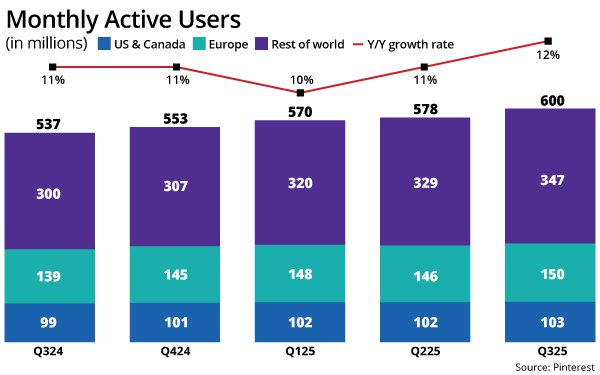
Building on a strong second quarter, Pinterest's latest performance report shows a boost in
revenue as the company added users across every region, reaching 600 million monthly actives for the first time in its 15-year history.
To hit 600 million monthly active users (MAUs),
Pinterest added 22 million users this previous quarter, marking a 12% year-over-year increase.
In Q2, the social discovery platform saw notable user gains in the “Rest of the
World” category, but stagnation or loss in key revenue markets, such as North America and Europe.
In Q3, Pinterest added users in every regional category, with 18 million more MAUs in
the “Rest of the World,” 4 million more MAUs in Europe, and 1 million more MAUs across the U.S. and Canada.
advertisement
advertisement
Due to Pinterest's growing ad business, investment in AI-powered tools
and its reputation as a shopping discovery platform, the company also saw a 17% rise in year-over-year revenue growth, bringing in just over $1 billion for the quarter.
According to a
valuation from investment firm Raymond James, Pinterest’s Performance+ campaigns delivered 24% higher conversion lift compared to traditional campaigns this quarter, with lower-funnel revenue
more than doubling since the AI-powered ad tool's launch.
Pinterest's in-app shopping initiatives also expanded with wider catalog onboarding and lower-funnel activation, reaching 30% of the
company's international revenue, compared to just 9% two years ago.
Over the past few months, in preparation for the holiday season, Pinterest has launched new shopping features, such as clickable product links and personalized AI-powered product recommendations.
The company also partnered with Instacart Ads and began
running its “Top of Search Ads” feature to better optimize the
visual shopping funnel.
In its recent analysis of Pinterest’s third-quarter performance, investment firm BMO Capital Markets writes that Top of Search Ads has helped drive a 29%
improvement in click-through rates compared to standard campaigns.
Overall, ad impressions increased 54% year-over-year, while pricing declined 24% due to a boost in international inventory,
which costs significantly less than ads in North America and Europe.